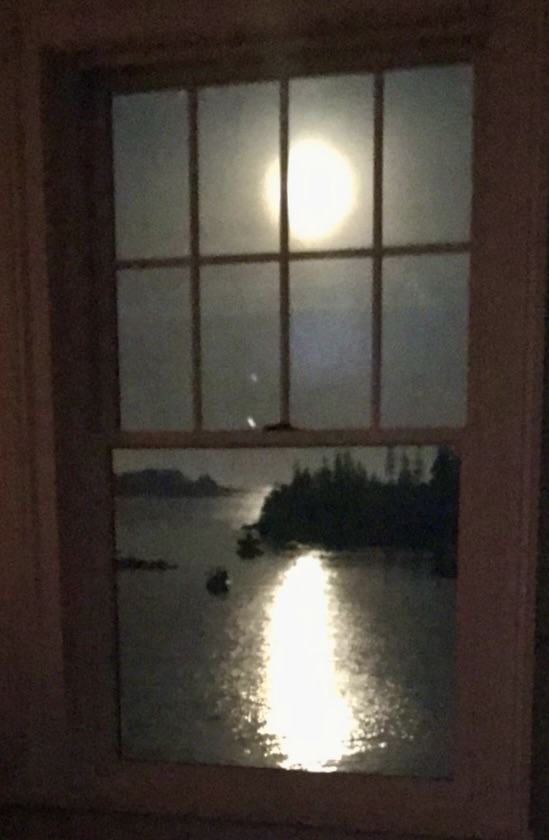It is a remarkably warm night for the season, the ground almost entirely bare. The stars are dazzlingly bright.
The fault may be in my own barrenness, but methinks there is a certain poverty about the winter night's sky.
The stars of higher magnitude are more bright and dazzling, and therefore appear more near and numerable, while those that appear indistinct and infinitely remote in the summer, imparting the impression of unfathomability to the sky, are scarcely seen at all. The front halls of heaven are so brilliantly lighted that they quite eclipse the more remote.
The sky has fallen many degrees. The river has risen and flooded the meadows again.
The white pines, now seen against the moon, with their single foliage, look thin.
These are some of the differences between this and the autumn or summer nights:
- the stiffened glebe under my feet,
- the dazzle and seeming nearness of the stars,
- the duller gleam from ice on rivers and ponds,
- the white spots in the fields and streaks by the wall sides where are the remains of drifts, yet unmelted.
Perhaps the only thing that spoke to me on this walk was the bare, lichen-covered gray rock at the Cliff, in the moonlight, naked and almost warm as in summer.
H. D. Thoreau, Journal, January 1, 1852
Moon little more than half full. Not a cloud in the sky. See October 1, 1851("The moon not quite half full. The twilight is much shorter now than a month ago, probably as the atmosphere is clearer and there is less to reflect the light."); December 5, 1856 ("It is a perfectly cloudless and simple winter sky. A white moon, half full, in the pale or dull blue heaven and a whiteness like the reflection of the snow, extending up from the horizon. ") See also A Book of the Seasons, by Henry Thoreau, January Moonlight
The stars dazzlingly bright. See December 31, 1851 (“I have not enough valued and attended to the pure clarity and brilliancy of the winter skies . . . in which the stars shine and twinkle so brightly in this latitude.”); January 29, 1854 ("Tonight I feel it stinging cold . . . it bites my ears and face, but the stars shine all the brighter.”)
The fault may be in my own barrenness, but methinks there is a certain poverty about the winter night's sky. See December 27, 1851 ("The sky is always ready to answer to our moods."); January 17, 1852 ("As the skies appear to a man, so is his mind."); See also July 23, 1851 ("The mind is subject to moods, as the shadows of clouds pass over the earth.")
The differences between this and the autumn or summer nights . . .the dazzle and seeming nearness of the stars, See December 31, 1851 (I have not enough valued and attended to the pure clarity and brilliancy of the winter skies. Consider in what respects the winter sunsets differ from the summer ones. Shall I ever in summer evenings see so celestial a reach of blue sky contrasting with amber as I have seen a few days since. The day sky in winter corresponds for clarity to the night sky, in which the stars shine and twinkle so brightly in this latitude. "); February 3, 1852 ("The heavens appear less thickly starred than in summer, - rather a few bright stars, brought nearer by this splendid twinkling in the cold sky."); Compare December 27, 1851 ("There is no winter necessarily in the sky. . .The heavens present, perhaps, pretty much the same aspect summer and winter.")
The bare lichen-covered gray rock in the moonlight, naked and almost warm as in summer. See May 16, 1851 ("A splendid full moon to-night. Walked from 6. 30 to 10 P M. Lay on a rock near a meadow, which had absorbed and retained much heat, so that I could warm my back on it"); August 2, 1854 (“I sit on rock on the hilltop, warm with the heat of the departed sun, in my thin summer clothes.”)
See also A Book of the Seasons, by Henry Thoreau, Reminiscence and Prompting
January 1. See A Book of the Seasons, by Henry Thoreau, January 1
Lichen-covered rock
almost warm as in summer –
naked in moonlight.
A Book of the Seasons, by Henry Thoreau
"A book, each page written in its own season,
out-of-doors, in its own locality.”
~edited, assembled and rewritten by zphx © 2009-2025
https://tinyurl.com/hdt-520101






No comments:
Post a Comment